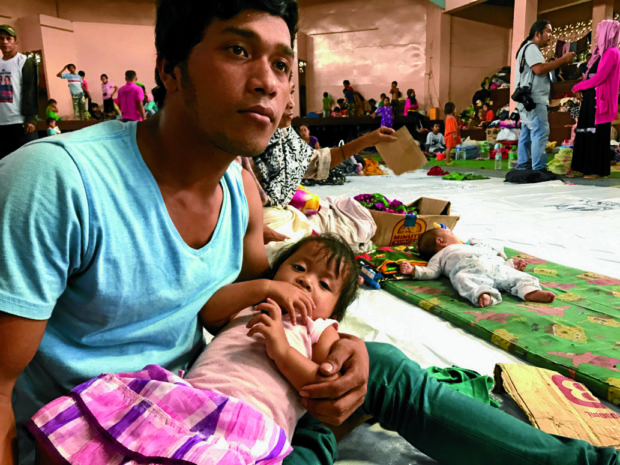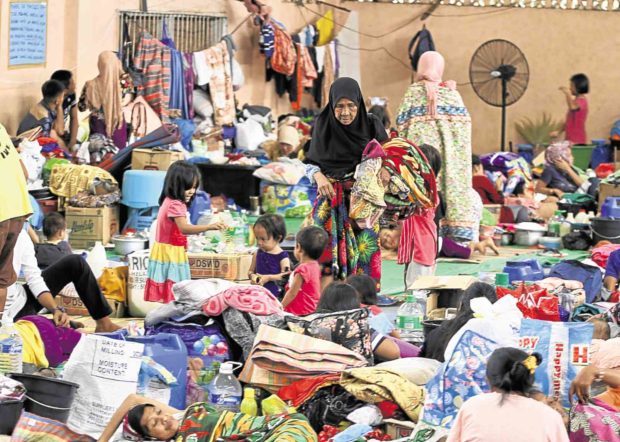Baby’s smile brings hope to sad dad

DREAMING OF HOME Alinor Tarip and daughter Hamida. —PHOTOS BY JASON GUTIERREZ
BALO-I, Mindanao — Alinor Tarip, a young father of 22, cradles his daughter, Hamida, at a packed evacuation center in this small town outside the now-partly destroyed city of Marawi, thinking of the day when Islamic State (IS)-inspired gunmen are finally flushed out and they would be able to return and rebuild.
He said his No. 1 priority was to try and find a home for his young family and 10 other relatives, who escaped certain death from the terrorists who laid siege to Marawi on May 23.
“I told myself that we should survive because we have a baby. If not for her, we would have stayed and would most likely be dead by now,” said Tarip, who used to be a driver and laborer. “Now, we have nothing. But once this is over, we will return and rebuild our home.”
Tarip, who is Muslim, was with his family when the gunmen started going from house to house, barging on doors and demanding to know their religion.
They carried rifles and said they were fighters for IS, whose acknowledged leader, Abu Sayyaf leader Isnilon Hapilon, had been spotted plotting a mass attack in Marawi earlier.
But when authorities went to arrest Hapilon, they were surprised to find that he was backed by the Maute group and several foreign fighters. In several clashes that followed, the terrorists torched several buildings, executed non-Muslims and took dozens of Christians captive.
Tarip said the family was trapped for two days and were angrily interrogated by the armed men who came knocking on their door. “But when they saw Hamida, they let us go. So she saved us,” he said, hugging his daughter on the grimy floor of the evacuation center.
The family had voted to stay. But when the violence escalated, they decided to flee.
What followed was a mad dash to safety, during which Tarip said he tightly held his baby and shielded her from the noise of war. Scattered gunfire was everywhere and bombs were falling at a distance.
Ghost town
He said the women in the group cried upon seeing the destruction all around them. The lively city of Marawi, where Muslims had long coexisted peacefully with Christians, had now been reduced into a virtual ghost town.
“We lost everything. But we have each other. And we owe it to my daughter and other children to rebuild,” Tarip said. “As a father, I want to return to Marawi and help it recover. I want my daughter to swim in the river where I used to swim, play in its streets where I used to play.”
Faiza Alawi, 36, who escaped with her 7-month-old nephew Mahadi, her two brothers and elderly parents, said they fled when the gunmen started occupying homes in Banggolo district, a few blocks away from the city hall.
Alawi described some of the fighters as foreign-looking and were apparently not from Marawi. At first, she said they were not entirely worried, until the first burst of gunfire rattled the neighborhood and shouts of “Allahu akbar” (God is great) rang out.
“Our neighbors closed their stores and ran for safety. We heard the men saying, ‘We are Isis,’ and firing into the air or toward the direction of the police,” she said, referring to another name for IS. “I don’t understand this. They destroyed the city we’re so proud to have built.
“Where will the children play now?” she said, recalling a small park near their home where children’s laughter was a constant accompaniment to the cacophony of small city life. “We were very happy once. Now we are reduced to begging for food.”

Marawi evacuees find their own space in a packed evacuation camp in Balo-i, Lanao del Norte.
Mementos
The family saved precious mementos from home: their framed portrait, pots and kettles, and a native cloth they suspended from the ceiling to form a makeshift swing for Mahabi, whose giggles helped light up the gloomy place.
Hundreds of other evacuees are scattered in towns outside Marawi. There are also those who were taken in by relatives. But aid has been slow in coming.
Hungry men, women and children braved crossing streets as rebel snipers fired at them, while planes dropped deadly bombs aimed at flushing out the rebels, but could also kill civilians.
Other survivors jumped into the churning waters of Agos River that divide the city, hoping to escape sniper fire and eventually making it out alive.
Provincial spokesperson Zia Alonto Adiong said rescuers who braved the daily violence to get those trapped in crossfire described harrowing details, including decomposing bodies strewn on streets and civilians barely able to walk because of hunger.
“Based on personal accounts of trapped residents who managed to escape, there were around a hundred bodies scattered on streets,” he said. “Some are already in an advanced state of decomposition.”
Death toll
If confirmed, this would significantly hike the death toll, which stood at nearly 300. More than half of that are enemy fighters, while the rest are government forces and civilians.
Former Social Welfare Secretary Dinky Soliman, who was helping in relief efforts, said the women volunteers tried to amuse each other by trying to put up a cheery demeanor.
“They tell each other, ‘Even if we are bakwits (evacuees), we have to look good,’” she said. “But the truth is, the situation remains very dire.”
Soliman has assisted the local Ranao Rescue Team and Al Mujadilla Foundation and distributed vital evacuation buckets that included personal items.
She said that in the town of Saguiran alone, many families who took in their relatives from Marawi were also now stretched beyond capacity. “After a month, whatever you have is not exactly enough, and you can’t turn away your relatives,” she said.
She recalled the story of one mother who told her that her baby desperately clung on to life as they raced to a safe zone. “But the baby never made it. The main cause is dehydration,” she said.
Dr. Alexis Gutoc, an emergency health expert providing assistance to the displaced, said many of the evacuees were children vulnerable to diseases and dehydration.
He said he believed that the military needed to clear the still-affected area immediately, and that if the violence continued to drag on, “more civilians [would] likely perish.”